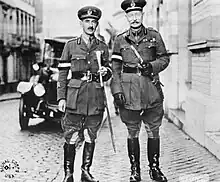Arthur Frank Umfreville Green | |
|---|---|
 Green (left) with General Haking in 1918 at Spa. | |
| Born | 1878 |
| Allegiance | |
| Service/ | |
| Rank | Brigadier-General |
| Commands held | 4th Battalion, Sussex Home Guard |
| Battles/wars | Anglo-Boer War World War I World War II |
| Awards | Distinguished Service Order |
Brigadier-General Arthur Frank Umfreville Green CMG DSO[1] (born 1878) was a senior British Army officer in World War I and author of several publications.
Military career
Green was commissioned as a second lieutenant in the Royal Garrison Artillery on 23 December 1897,[2] and in March 1900 left Southampton on the SS Umbria to serve in South Africa in the Second Boer War.[3] During World War I he was deployed in Flanders and in Italy. He served as a quartermaster general with the XI Corps and was part of the Inter-Allied Commission at the Spa Conference of 1920.[4] From 1920 to 1924 he was commanded to Malta.[4] In World War II he commanded the 4th battalion of the Sussex Home Guard.
Works
- As Down Of Thistle (1904) under the Pen name Arthur Wenlock.[5]
- The Countermine (1905) under the Pen name Arthur Wenlock.[5]
- Landscape sketching for military purposes, London, Hugh Rees, 1908.[6]
- Evening Tattoo, 1940.[6]
- The British Home Guard Pocket-Book, 1940.[6]
- Questions Answered about Rifle Shooting, 1945.[6]
References
- ↑ "haileybury.com". Archived from the original on 24 September 2015. Retrieved 21 September 2015.
- ↑ Hart′s Army list, 1901
- ↑ "The War - Embarcation of Troops". The Times. No. 36099. London. 26 March 1900. p. 7.
- 1 2 Stanley Paul: "Evening Tattoo. By Brigadier-General A. F. U. Green." The Spectator
- 1 2 "The British Home Guard Pocketbook", 1940
- 1 2 3 4 John McKendrick Hughes: The Unwanted: Great War Letters from the Field, 2005, University of Alberta Press, ISBN 978-0888644367, p.366
Wikimedia Commons has media related to Arthur F. Green.
This article is issued from Wikipedia. The text is licensed under Creative Commons - Attribution - Sharealike. Additional terms may apply for the media files.